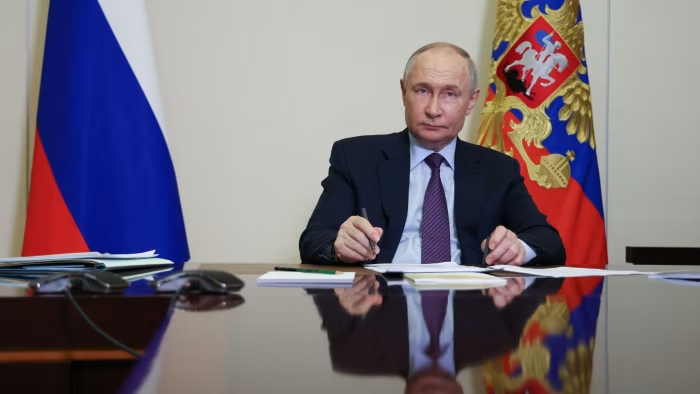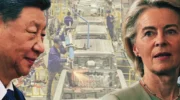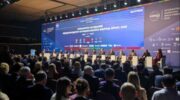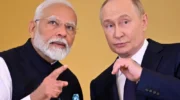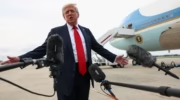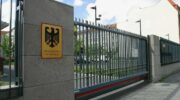Moscow hopes transfer of seized business back to Italian owner will show companies a path back into Russian market.
Italian officials watched with horror 12 months ago as the Kremlin seized the local business of heating systems maker Ariston and handed it to Russia’s biggest gas producer.
Ariston Thermo Rus was the latest European-owned company to be appropriated for the benefit of a local player in response to the western sanctions that followed Russia’s 2022 assault on Ukraine — only this time, the story had a different ending.
President Vladimir Putin signed a decree last month transferring the business back to Ariston — the result of intense lobbying by high-ranking Italians, according to people involved with the negotiations.
The case marks the first time Moscow has ended the external management of a seized company not through a forced sale but by giving the business back to its owners.
It comes as Russian officials, from members of parliament to Putin himself, have in recent weeks suggested that the government begin preparing for a return of foreign companies, although businesses coming back to the country will face strict conditions.
“The Russian government saying that the door is open and there will be conditions [gives] a signal that if you come too late, there might be problems,” said one western businessman in regular contact with Russian officials. “They want to create this effect that it’s now or never.”
The effort to show western companies a path back into the Russian market comes amid a nascent détente between Moscow and Washington since Donald Trump’s return to the White House.
While there is little evidence of any other major western company plotting a Russian comeback, the Kremlin has been keen to lay out the terms under which they can do so.
Putin suggested last month that any returning businesses would need to give “mandatory guarantees of conscientious and responsible conduct”, while Kirill Dmitriev, the head of Russia’s sovereign wealth fund, has said one condition for return might be a joint venture with a Russian partner.
The seizure and transfer to Gazprom of Ariston’s subsidiary, which makes and sells water heaters and has been active in Russia for almost half a century, triggered outrage in Rome and Brussels.
Prime Minister Giorgia Meloni’s government summoned Russia’s ambassador to Italy, Alexey Paramonov, to protest against the move. One Italian government official told the Financial Times that the expropriation appeared to have been politically motivated and driven by Moscow’s “strong sensitivity” regarding “the confiscation of frozen assets abroad”.

But as with other seizures, the appropriation was described from the start as “temporary and revocable”, leading to hopes that Putin — who according to the decree accompanying the move would personally decide how long state control would last — might be persuaded to return it.
“The temporary nature and revocability of the measure was indicated from the very beginning,” the Italian official said.
One person involved with the negotiations said the Italian foreign ministry, Italian embassy in Moscow and a private Italian individual had all played key roles in negotiating the reversal.
Ariston had probably been targeted as a tit-for-tat for seizures of Gazprom and Rosneft subsidiaries in Europe, the person said. A year earlier Moscow had seized the Russian assets of two European utility companies — Finland’s Fortum and Germany’s Uniper — and handed them to Rosneft.
Yet Gazprom Household Systems, the subsidiary that gained control of the Ariston unit, struggled to wrap its head around the business, according to two people familiar with the negotiations — another reason Russia might have been more willing to give it up.
The decree returning the Russian operation which had about 300 employees, to Ariston’s full ownership and operational control was signed on March 26.

“Ariston demonstrated patience and exhausted all the necessary appeals,” the Italian government official said, adding that the company also made clear its “interest in continuing to operate in the Russian market in compliance with the sanctions and local legal frameworks”.
Ariston’s owner Paolo Merloni said in a statement last month that Moscow’s decision was “a sign of the recognition of decades of investment and responsible management” in Russia, and affirmed the company’s commitment to “continuing our journey” in the country, albeit in compliance with western sanctions and local regulations.
Merloni declined requests for further comment.
Whether Russia will succeed in encouraging other foreign companies to consider a return to the country is less clear.
Ivan Chebeskov, deputy finance minister, acknowledged this month that the finance ministry had still not received any applications from foreign businesses hoping to return to Russia.
Meanwhile, Moscow market participants said they had only seen small signs of tepid foreign interest.
Some foreign companies that have still been trying to withdraw from the Russian market, for instance, are now slow-rolling such plans until they see how the situation develops, according to four people involved in such deals.
One senior executive in the commodities sector reported that representatives of large international commodity traders had recently been seen in Moscow having breakfast and lunch with representatives of large Russian commodity firms. Some investment bank representatives had also been seen in Moscow, he said.
But he and others cautioned that they did not expect an influx of foreign investment to Russia or a return of publicly listed US companies that had gone through painful exits from the country — at times taking a 50 per cent cut on the value of the assets.
“The Russian officials wanted to create the impression that everything is hunky dory and that we’re days away from doing business as usual,” said Steven Dashevsky, chief investment officer of D&P Advisors. “And I think nothing really could be further from the truth.”

